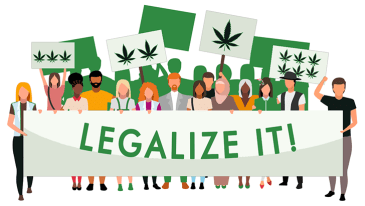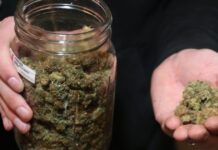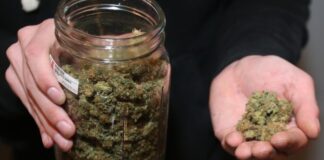Sixty-seven percent of US voters say that “nobody should be in jail for [the] possession of marijuana,” and an even greater percentage oppose its categorization as a Schedule I controlled substance under federal law, according to nationwide survey data compiled by Data for Progress.
Seventy-eight percent of Democrats, as well as 70 percent of Independents and 54 percent of Republicans, say that no one should be incarcerated for possessing cannabis. Voters support legislation “to legalize marijuana at the federal level for all adults” by similar percentages.
“With the midterm elections fast approaching, federal lawmakers — and Democratic leadership in particular — would be wise to heed voters’ calls and to fast-track legislative efforts to amend America’s failed and unpopular marijuana prohibition laws,” NORML’s Deputy Director Paul Armentano said. “Doing so would galvanize the Democratic base while simultaneously appealing to many Republicans and Independents — in a way that few if any other hot-button political issues would. It would affirm America’s longstanding principles of federalism and appeal to Americans’ deep-rooted desires to be free from undue government intrusion into their daily lives. Most importantly, repealing marijuana prohibition would adjust federal law to America’s rapidly changing cultural and legal landscape.”
Voters support removing cannabis from its Schedule I prohibited classification by even larger margins. Eighty percent of respondents, including 88 percent of Democrats and 70 percent of Republicans, said that “federal law should not classify marijuana in the same category as heroin or LSD.” Since 1970, the US Controlled Substances Act has categorized marijuana in the same classification as heroin — defining it as a substance with a “high potential for abuse, … a lack of accepted safety, … and no currently accepted medical use in treatment in the United States.”
NORML has long called for the removal of cannabis from the CSA (a/k/a descheduling) in a manner similar to alcohol as opposed to moving it to a lower schedule like cocaine (Schedule II) or anabolic steroids (Schedule III). “In order to rectify the state/federal conflict that currently exists over marijuana policy, and in order to best maintain the market controls that a majority of states have enacted to promote public health, prevent the distribution of marijuana to minors, ensure safe business practices, and improve public safety, cannabis must be descheduled — not rescheduled — from the Controlled Substances Act,” NORML acknowledges in a position statement.
The Data for Progress poll also reported widespread voter support for pardoning those with low level marijuana convictions. That result is similar to other polls. Earlier this month, The President announced forgiveness for an estimated 6,500 people with marijuana-related federal convictions on their record. He also called upon Governors to take similar steps. According to archived data from the FBI, an estimated 29 million Americans have been arrested for violating state or local marijuana laws since the mid-1960s.
NORML’s Deputy Director praised the President’s actions in an op-ed, opining, “Biden’s foray into the arena of marijuana reform legitimizes legalization as a subject worthy of consideration — and action — by those at the highest levels of government. Further, it is a recognition — by the president of the United States, no less — that America’s nearly 100-year experiment with cannabis criminalization has been an abject failure.”
Over the past few years, lawmakers in nearly two dozen states have enacted legislation explicitly facilitating the process of having select marijuana convictions expunged, vacated, otherwise set aside, or sealed from public view. These laws have led state and local officials nationwide to expunge or seal the records of over two million people with prior cannabis convictions. (In some states, the law provides for the automatic review and expungement of marijuana-related records, while in others, those who wish to have their records sealed must actively petition the courts for relief.) In addition, the Governors of Colorado, Nevada, Illinois, and Washington have also granted an estimated 30,000 pardons to those with low-level marijuana convictions.
In response to separate polling questions, most voters (64 percent) agreed that marijuana possesses “positive health effects” and 53 percent said that it was “safer than alcohol.”
A majority of Republican voters did not agree with the latter statement, nor did they believe that people of color are disproportionately impacted by marijuana law enforcement. A 2020 analysis by the American Civil Liberties Union, concluded, “Black people are 3.64 times more likely than white people to be arrested for marijuana possession, notwithstanding comparable usage rates.”
Additional polling data is available from NORML here.











